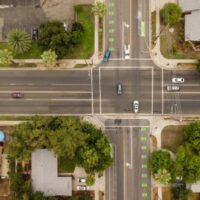Who Is at Fault in an Intersection Car Accident in Florida?

Accidents at intersections are quite common in the U.S., Florida not being an exception. According to the Federal Highway Administration (FHA), more than 2 million intersection accidents happen annually. It is estimated that 40% of all accidents in the U.S. involve intersections. This means that intersection accidents come second after rear-end collisions. Intersection car accidents can result in significant injuries, damages, and even fatalities. Determining liability in an intersection car accident is critical, as it directly impacts the ability of victims or their families to recover compensation. In this article, our personal injury attorneys discuss the leading causes of intersection accidents in Florida and how fault is determined after a Florida intersection accident.
Causes of Intersection Accidents in Florida
Intersection accidents are common in the Sunshine State. While many factors contribute to these unfortunate incidents, the primary causes of intersection accidents in Florida are driver negligence and environmental factors. The following are some of the leading causes of intersection accidents in Florida;
- Distracted driving: Activities like texting, using a GPS, or adjusting the radio while driving can lead to delayed reactions, causing accidents at intersections.
- Speeding: Speeding reduces a driver’s reaction time and increases the impact force in case of an accident.
- Running a red light or stop sign: Disregarding traffic signs or signals at intersections can result in serious accidents, such as T-bone accidents.
- Failure to yield: A driver may misjudge the speed of an oncoming vehicle, resulting in an accident.
- Impaired driving: Drug or alcohol impairment affects coordination, affects judgment, and slows reaction time.
- Weather conditions: Adverse weather conditions like snow, fog, or rain can diminish visibility and make roads slippery, increasing the risk of intersection collisions.
- Intersection design: Poorly designed intersections or intersections with inadequate signage can lead to confusion, which can contribute to accidents.
Determining Fault in Florida Intersection Car Accidents
Determining fault after a Florida intersection accident requires investigating the specific circumstances surrounding the accident. Several pieces of evidence play a vital role in determining fault, including;
- Police reports
- Eyewitness statements
- Traffic camera or dashcam footage
- Expert testimony
- Physical damage to vehicles
- Photos of the accident scene
In a Florida intersection car accident, fault generally lies on the party that disobeyed traffic laws, including by;
- Speeding
- Making an improper turn
- Running a red light or stop sign
- Distracted driving
- Driving under the influence
Florida’s modified comparative negligence law recognizes that multiple parties may be liable in an intersection accident. When more than one party is to blame for an intersection accident, the fault is apportioned among the parties, and each party is responsible for damages in proportion to their percentage of fault. For instance, if three drivers are found to be 40%, 35%, and 25% at fault, the first driver will cover 40% of the total damages, the second will cover 35%, and the third will cover 25%. In Florida, if a claimant is partially at fault for their intersection car accident, they can only recover compensation if they are found to be 50% or less at fault.
Contact Us for Legal Help
Determining fault after an intersection car accident can be complex. If you are involved in an intersection car accident, it’s best to consult an attorney. Our Jacksonville personal injury attorneys at The Pendas Law Firm can help you navigate the complexities of your case. Contact us today to schedule a consultation.
The Pendas Law Firm also represents clients in the Tampa, Fort Myers, Ocala, Orlando, Bradenton, Daytona Beach, West Palm Beach, Miami, Naples, Melbourne, and Fort Lauderdale areas.
Source:
myfloridahouse.gov/Sections/Documents/loaddoc.aspx?FileName=_h0837er.docx&DocumentType=Bill&BillNumber=0837&Session=2023

